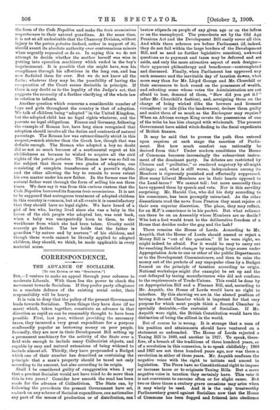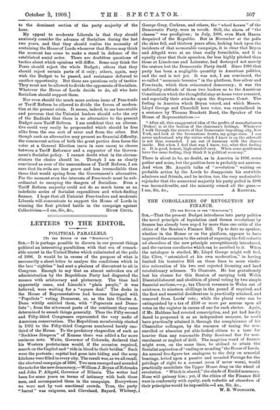CORRESPONDENCE.
THE ADVANCE OF SOCIALISM.
rTo THE EDITOR 07 THE "SPECTATOR-"l
SIR,-I venture to make an appeal through your columns to moderate Liberals. With them lies the power to check the movement towards Socialism. If they prefer party allegiance to a resolute defence of the existing social order, their responsibility will be heavy.
It is vain to deny that the policy of the present Government leads towards Socialism. Three things they have done (if no more) which, taken together, constitute an advance in that direction as rapid as can be reasonably thought to have been possible. First, last year, without providing the necessary taxes, they incurred a very great expenditure for a purpose confessedly popular as bestowing money on poor people. Secondly, they are now in their Development Bill setting up a permanent machinery for the activity of the State over a field wide enough to include many Collectivist objects, and capable by easy and natural extensions of being widened to include almost all. Thirdly, they have propounded a Budget which one of their number has described as containing the principle that a man's property should be taxed not only according to its amount, but also according to its origin.
Shall I be considered guilty of exaggeration when I say that a prudent Socialist would not have tried to do more than this in two years ? Consider how smooth the road has been made for the advance of Collectivism. The State can, by following the precedents the present Government have set, embark on any scheme of Socialist expenditure, can nationalise any part of the means of production or of distribution, can bestow stipends on people of any given age or on the infirm or on the unemployed. The precedents set by the Old Age Pensions Act and the Development Bill easily cover all this. And while these schemes are before Parliament (if, indeed, they do not fall within the large borders of the Development Bill, and so need no further legislative sanction), awkward questions as to payment and taxes may be deferred and set aside, and only the more attractive aspect of such designs— their apparent philanthropy and beneficence—contemplated and discussed. Finally, when Parliament has approved any such measure and the inevitable day of taxation dawns, what more easy than for Mr. Lloyd George and Mr. Churchill or their successors to look round on the possessors of wealth, and selecting some whose votes the Administration are not afraid to lose, demand of them, "How did you get it?" (after Mr. Churchill's fashion), and, arraigning them on the charge of being wicked (like the brewers and licensed victuallers) or idle (like the landowners), declare them guilty and mulct them of as much as the Exchequer may require-? When an African savage King covets the possessions of one of the tribe he has him charged with witchcraft. The present Government have added witch-finding to the fiscal expedients of British finance.
It may be said that to pursue the path thus entered upon requires at each stage the sanction of Parlia- ment. But how much comfort can rationally be derived from this ? Under modern conditions the House of Commons becomes increasingly the subservient instru- ment of the dominant party. Its debates are restricted by Closure and "guillotine," or rendered nugatory by all-night sittings; and, what is still worse, independence among its Members is rigorously punished and effectually suppressed. How many Liberal Members axe in their hearts opposed to the Land-taxes ? We cannot tell : but more assuredly than have opposed them by speech and vote. Nor is this servility surprising. Mr. Harold Cox, who did his duty according to his conscience, has been promptly ostracised. As the other dissentients read the news from Preston they must rejoice at their own superior discretion. The place, they may reflect, for an M.P.'s conscience is in his pocket. But what reliance can there be on an Assembly whose Members are so docile ? Who but a fool would trust to the deliberative freedom of a House that decides under the gag and the lash?
There remains the House of Lords. According to Mr. Asquith, that the House of Lords should amend or reject a Money Bill is "out of the question." If he were right, we might indeed be afraid. For it would be easy to carry out far-reaching Socialist changes by assigning large sums under Appropriation Acts to one or other of the public Departments or to the Development Commissioners, and then to raise the money out of the pockets of any unpopular class by a Budget framed on the principle of taxation according to origin. National workshops might (for example) be set up and the cost defrayed by taxing manufacturers who did not conform to the requirements of Trade-Unions. This could be done by an Appropriation Bill and a Finance Bill, and, according to Mr. Asquith, the House of Lords would have no right to interfere. By this showing we are in the absurd position of having a Second Chamber which is impotent for that very purpose for which most people think a Second Chamber is specially desirable,—the restraint of Socialism. If Mr. Asquith were right, the British Constitution would have the distinction of being the silliest in the world.
But of course he is wrong. It is strange that a man of his position and attainments should have ventured on a statement so unfounded. The House of Lords rejected a Taxing Bill in 1860, and another in 1827. To speak, there- fore, of a breach of the traditions of three hundred years, or of a revolution in this connexion, is to speak childishly; 1860 and 1827 are not three hundred years ago, nor was there a revolution in either of those years. Mr. Asquith confuses the negative voice with the right to initiate and amend in legislation. The Peers have no Constitutional right to impose or increase taxes or to originate Taxing Bills. But a mere negative voice in taxation they certainly have. This veto it is not convenient to exercise often or for slight cause. But two or three times a century grave occasions may arise when
it may wisely be used. And it is the only trustworthy Parliamentary guard against Socialism now that the House of Commons has been flogged and fettered into obedience to the dominant section of the party majority of the hour.
My appeal to moderate Liberals is that they should anxiously consider the advance of Socialism during the last two years, and that they should realise the necessity of sustaining the House of Lords whenever that House may think the moment has come to make a stand in defence of the established social order. There are doubtless questions of tactics about which opinions will differ. Some may think the Peers should reject the whole Budget ; others that they should reject certain parts of it only; others, again, may wish the Budget to be passed, and resistance deferred to another opportunity. But these are questions only of tactics- They must not be allowed to divide the opponents of Socialism. Whatever the House of Lords decide to do, all who hate Socialism should support them.
Nor even should the much more serious issue of Free-trade or Tariff Reform be allowed to divide the forces of modera- tion at the present crisis. It seems, indeed, to me lamentable and perverse that the Unionist leaders should echo the cry of the Radicals that there is no alternative to the present Budget save Tariff Reform. I am confident that an alterna- tive could very easily be propounded which should be free alike from the one sort of error and from the other. But though such an alternative may present no financial difficulty, the concurrent action of both the great parties does force the voter at a General Election (save in rare cases) to choose between a Tariff Reformer and a supporter of the Govern- ment's Socialist policy. I cannot doubt what in the circum- stances the choice should be. Though I am as clearly convinced as ever of the unsoundness of Tariff Reform, I am sure that its evils are less grave and less irremediable than those that would spring from the Government's alternative. For the moment even the interests of Free-trade must be sub- ordinated to escaping the dangers of Socialism. Even a Tariff Reform majority could not do so much harm as an indefinite series of Socialist expenditure and witch-finding finance. I hope that all Unionist Free-traders and moderate Liberals will concentrate to support the House of Lords in winning the first pitched battle in the campaign against



























































 Previous page
Previous page